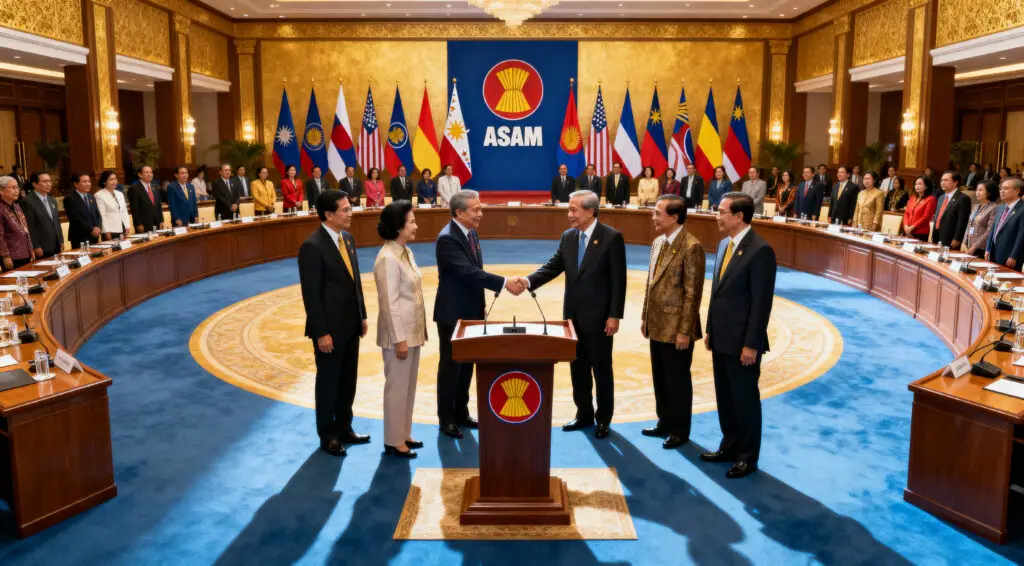Philippines Takes ASEAN Helm Amid Calls for Continuity
As the Philippines takes over as chair of ASEAN, experts in the area underline the need to keep Malaysia’s diplomatic and economic momentum going in order to protect Southeast Asia’s peace, stability, and prosperity. The transfer, which took place in Kuala Lumpur, was an important event for Manila’s authorities as the region deals with growing geopolitical and economic problems.
Experts argue that the Philippines has to find a balance between keeping up diplomatic ties and coming up with new ideas. This will make sure that ASEAN’s efforts, such as mediating conflicts and integrating economies, keep moving forward in a way that is both unified and autonomous.

Source: E-International Relations
Building on Malaysia’s Diplomatic Breakthroughs
Faiz Abdullah, head of Malaysia’s Institute of Strategic and International Studies (ISIS), warned against losing momentum following Malaysia’s recent triumphs, such as the first trilateral summit with ASEAN, the Gulf Cooperation Council, and China.
He responded, “You have a mix of dynamic forces at work.” “ASEAN and the GCC are strong, and with China in the mix, the strategy is even deeper.” He went on to say that China’s technology skills and the GCC’s financial resources might change the way countries in the area work together and grow, as long as the Philippines keeps up the good work.
Strengthening ASEAN’s Unity on Myanmar and the South China Sea
Ilango Karuppannan, a veteran diplomat, told Manila to keep up Malaysia’s work on the South China Sea and Myanmar, which are two of ASEAN’s hardest problems. He stressed that these problems should stay inside the ASEAN framework and not be affected by outside forces.
Ilango, Malaysia’s former ambassador to Singapore, suggested naming a permanent special envoy to deal with the Myanmar situation. This might help keep mediation going and make progress. “The envoy is replaced just as things start to calm down. Continuity is a big problem,” he remarked. Ilango and Faiz both agreed that one of the Philippines’ most important goals should be to keep leadership stable.
Recommended Article: Thailand PM Highlights Growth Plans at SET Roadshow 2025
Turning Economic Potential Into Tangible Gains
Joanne Lin, a senior fellow at Singapore’s ISEAS–Yusof Ishak Institute, noted that Malaysia’s chairmanship achieved certain important goals, but many of its projects are still not finished. She told Manila to turn ASEAN’s ideas into real sectoral roadmaps and ways to get money.
Lin said that ASEAN has to come together on new economic and technology concerns, especially because the US-China relationship is changing. She said that the Philippines should fight for an ASEAN semiconductor roadmap and a digital infrastructure fund. This will turn regional cooperation into real outcomes that help the area stay competitive in the long run.
Enhancing ASEAN’s Political Cohesion
Lin said that ASEAN’s careful diplomacy has kept the group together, but it has also held down development. She suggested that Manila may play a bigger political role in reaching agreement and speeding up changes without upsetting the equilibrium in the region.
The Philippines may assist ASEAN in evolving from reactive diplomacy to proactive leadership on problems like maritime security, energy cooperation, and digital transformation by doing this. Analysts say that these goals will determine how important ASEAN is in a world that is changing quickly.
Lessons from Malaysia’s Strategic Leadership
Analysts commended Malaysia’s use of soft power and strategic diplomacy to deal with geopolitical concerns, especially when it came to keeping good ties between big nations. Faiz, on the other hand, called the East Asia Summit a “Jurassic institution,” saying that it had become a staged formality with little real progress.
Lin also said that ASEAN’s reaction to crises like Myanmar’s conflict, turmoil in Indonesia, and boundary conflicts between Thailand and Cambodia has sometimes seemed delayed and disconnected, which hurts the bloc’s reputation and public trust.
Advancing ASEAN’s People-Centered Vision
Lin told the Philippines to make ASEAN’s people-centered agenda more real in order to repair trust. She emphasized that inclusive growth, which is an important part of Malaysia’s leadership, should be at the center of Manila’s leadership.
She remarked, “ASEAN needs to close the communication gap so that people know how working together makes jobs, schools, and communities stronger.” “That’s what really matters to the people of ASEAN at the end of the day.”
A Mandate for Progress and Stability
Experts believe that the Philippines’ biggest task and potential as the head of ASEAN would be to keep things going. By building on Malaysia’s diplomatic foundation and pressing for action over symbolism, Manila can present ASEAN as a cohesive, forward-looking organization ready to handle both geopolitical challenges and shared development aspirations.
The Philippines is now responsible for turning ASEAN’s promise into tangible benefits for its people and allies, with a new focus on stability, inclusiveness, and economic integration.























